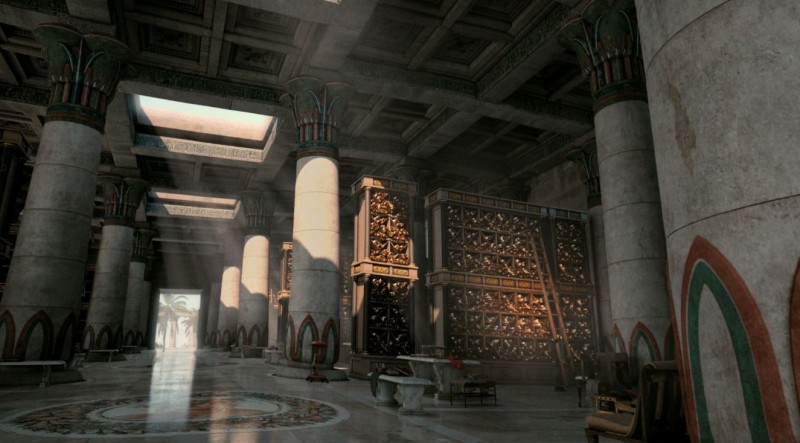
Introduction
In the annals of history, few places captivate the imagination quite like the Library of Alexandria. Revered as an ancient center of learning, it stood as a beacon of knowledge, housing a vast collection of texts and documents from diverse civilizations. However, its fate remains shrouded in mystery, with conflicting accounts of its destruction. This article delves into the enigmatic story of the Library of Alexandria, exploring its significance, contents, and the events surrounding its alleged demise.
1. The Birth of the Library of Alexandria
In the 3rd century BCE, the ambitious Ptolemaic dynasty embarked on a mission to create a grand institution that would rival the intellectual centers of the ancient world. Led by Ptolemy I Soter, the first Pharaoh of the dynasty, the Library of Alexandria emerged as a testament to their vision. Located in the bustling city of Alexandria, Egypt, it became a melting pot of ideas, attracting scholars, philosophers, and intellectuals from far and wide.
2. The Great Repository of Knowledge
The Library of Alexandria was not merely a building filled with books but rather a grand institution that sought to collect, preserve, and disseminate knowledge. It aimed to amass a comprehensive collection of scrolls and manuscripts, spanning disciplines such as astronomy, mathematics, philosophy, medicine, history, and literature. This impressive compilation of texts provided a rich tapestry of ideas, fostering intellectual growth and scholarly pursuits.
3. Scholars and Visitors
Renowned luminaries, including Euclid, Archimedes, and Eratosthenes, were among the distinguished scholars who graced the halls of the Library. These intellectual giants engaged in rigorous debates, conducted groundbreaking research, and expanded the boundaries of human knowledge. As word spread about the Library's treasures, visitors from all corners of the ancient world arrived, seeking wisdom and enlightenment.
4. The Fire that Devastated the Library
The most lamentable event in the Library's history is the fire that ravaged its magnificent halls. Although the precise details are lost to the sands of time, historical accounts suggest that the disaster occurred on multiple occasions. One of the most significant fires, said to have transpired during Julius Caesar's siege of Alexandria in 48 BCE, is often cited as the primary cause of the Library's demise.
5. Controversial Theories Surrounding the Destruction
Despite popular belief, the complete destruction of the Library of Alexandria remains a subject of debate among historians and scholars. While some attribute its downfall to the aforementioned fires, others propose alternative scenarios, such as gradual decline, looting, or the library's relocation. These theories underscore the complex nature of historical narratives and the challenges of unraveling ancient events.
6. The Legacy of the Library
Although the Library of Alexandria may have suffered a tragic fate, its legacy endures. It served as a symbol of the pursuit of knowledge, inspiring future generations to safeguard and expand the collective wisdom of humanity. Even in its absence, the Library's influence reverberated through time, shaping the development of libraries and educational institutions worldwide.
7. The Quest for Lost Knowledge
The loss of the Library of Alexandria has ignited a fervent quest to recover the lost texts and revive the knowledge they once contained. Scholars, historians, and archaeologists continually strive to piece together fragments of the past, exploring ancient sites, deciphering inscriptions, and unearthing hidden treasures. These endeavors offer glimmers of hope that some of the lost works may one day be rediscovered.
8. The Digital Age: A Modern-Day Library
In the digital age, the concept of a library has transcended physical boundaries. The internet has become a vast repository of information, accessible to billions worldwide. Websites, digital archives, and online libraries have democratized knowledge, empowering individuals to explore a wide array of subjects. While the scale may differ, the essence of the Library of Alexandria lives on in this modern incarnation.
9. Preserving Our Collective Wisdom
As custodians of knowledge, it is our collective responsibility to preserve and protect the wisdom accumulated over centuries. Libraries, both physical and digital, play a vital role in safeguarding this heritage. By embracing emerging technologies, collaborating globally, and valuing intellectual diversity, we can continue the noble tradition of the Library of Alexandria, ensuring that future generations have access to the wealth of human understanding.
Conclusion
The Library of Alexandria, a revered center of learning in antiquity, evokes a sense of wonder and lamentation. While its ultimate fate remains veiled in uncertainty, its significance as a beacon of knowledge cannot be overstated. As we embark on our own intellectual journeys, we honor the spirit of the Library by cherishing knowledge, embracing curiosity, and fostering a collective pursuit of wisdom.
India's Space Program Soars, ISRO Inspires Scientific Advancement